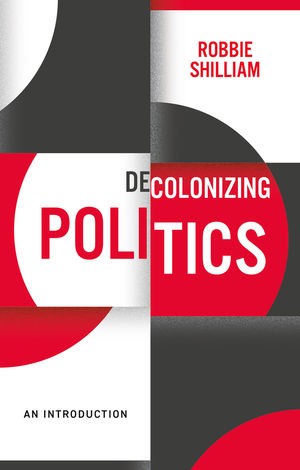Robbie Shilliam wrote "Decolonizing Politics: An Introduction" in 2021, and it is thankfully affordable for an academic book ($18). The book takes a different road to the conversation that ones I had read, and in that regard it was interest and a great place for new insights. The level of text is well suited to undergraduate students, which is a welcome addition as many of authors writing in this area are really suitable for graduate level and not accessible beyond a niche. Recommended for consideration in your classes.
Note: For some reason the text of the book was not searchable (even via Google Books), which I usually use to double check the quotes. If you notice any errors, appreciate if you can let me know.
"There is an easy option to decolonizing the study of politics. You can simply search for the most exotic forms of politics around the world and revel in their alien-ness. But in doing so, you'd keep the 'familiar' familiar and the 'unfamiliar' unfamiliar. There would be no intimate engagement between 'them' and 'us'. No question raised as to what counts as 'exotic' to whom and why. No stakes at play. Put another way, if you moved your focus to a study of the "margins" only, then that would leave the "Center" intact. Your movement would thereby avoid difficult but compelling questions such as: Who made their lives central and other people's lives marginal? And, by what logic are the margins divided from the center?" (p. 2)
"In what follows, I recontextualize, reconceptualize, and reimagined four popular subfields of political science: political theory, political behavior, development in comparative politics, and war and peace in international relations." (p. 18)
"In his anthropological writings, Kant maps out a particular geography of race which betrays a fundamental logic of difference: the white race can fulfill human potential; the other races cannot. I will suggest that the universal rights of which Kant boasts are only universal to those racially counted as properly human, that is white European men, when it comes to the rest of humanity, Kant provides a practical guide for their colonization." (p. 27)
"While Darwin, Spencer, and Galton differed on the mechanisms and consequences of inheritance and evolution, all of them eventually asserted that mental fitness differed between human groups. What's more all of them proposed that the human struggle envisioned by Malthus took place between races. The science of heredity was avowedly a race science. Empire and colonial rule were fundamentally implicated in the rare logics of this science via concerns for the integrity of the anglo-saxon race as it emigrated to the four corners of the earth as urbanisation in the imperial centre mixed populations within a dysgenic industrial landscape." (p. 61)

